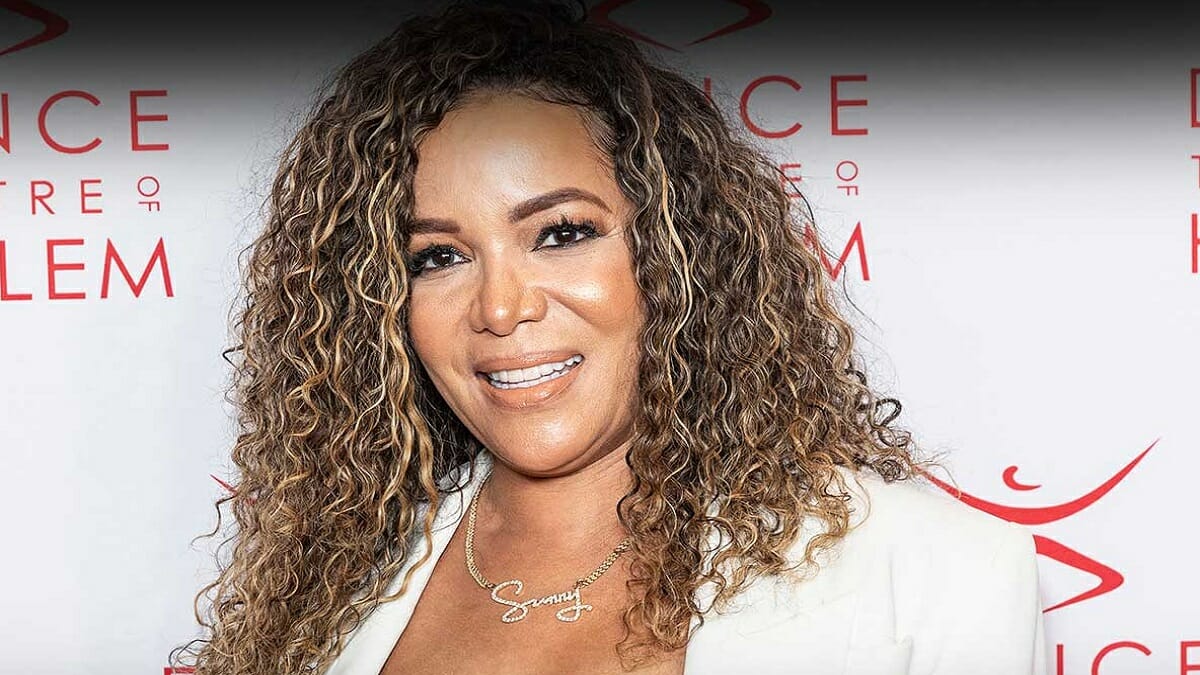Have you ever wondered what it's like to live in the public eye while battling a personal health challenge? Sunny Hostin, the vibrant co-host of The View, faces such a reality, and she has been diagnosed with alopecia. This autoimmune condition has not only changed her personal life but has also turned her into an advocate for millions.
Alopecia is more than just hair loss; its an autoimmune disorder where the body's immune system mistakenly attacks hair follicles. This can manifest in various ways, affecting the scalp, eyebrows, eyelashes, and even other parts of the body. The causes are complex, ranging from genetic predispositions to hormonal imbalances and the often-debilitating effects of stress. The condition does not discriminate, touching the lives of people across all demographics.
What distinguishes Sunny Hostin is not just her diagnosis, but her courage in using her platform to illuminate the realities of living with alopecia. She has spoken candidly about the emotional toll, the struggle with self-image, and the societal pressures that accompany hair loss. Her openness has sparked conversations, challenged misconceptions, and provided solace to countless individuals who felt isolated in their own battles. Her role as a vocal advocate extends beyond personal storytelling; she champions research initiatives and the development of improved treatments, aiming to transform the landscape for those living with this condition.
- Kia Becht The Ultimate Guide To Understanding Everything About This Trending Topic
- Mag Graphic Your Ultimate Guide To Revolutionizing Visual Content
While alopecia affects approximately 2% of the population, its impact is often minimized or misunderstood. The resulting shame and embarrassment can be profound, leading to social withdrawal and diminished self-esteem. By sharing her journey, Hostin is dismantling these stigmas, fostering a supportive environment where others feel empowered to seek help and embrace their experiences. Her visibility challenges the conventional standards of beauty, promoting a more inclusive and compassionate understanding of health and identity.
| Attribute | Details |
|---|---|
| Name | Sunny Hostin |
| Born | October 20, 1968 |
| Birthplace | New York City, New York |
| Occupation | Lawyer, journalist, television personality |
| Spouse | Emmanuel Hostin |
| Children | Gabriel Hostin, Paloma Hostin |
| Education |
|
| Career Highlights |
|
| Official Website | sunnyhostin.com |
Sunny Hostin, a prominent co-host of the daytime talk show The View, boasts a multifaceted career as a former federal prosecutor and astute legal analyst. Her journey took a personal turn in 2018 when she bravely disclosed her diagnosis of alopecia, an autoimmune condition characterized by hair loss. This revelation has not only reshaped her personal narrative but also positioned her as a powerful voice within the alopecia community, advocating for understanding, acceptance, and improved treatment options.
The prevalence of alopecia, affecting up to 2% of the population, underscores the importance of awareness and education. Often, the condition is shrouded in misunderstanding, leading to feelings of isolation and shame for those affected. Hostins decision to share her experiences publicly has been instrumental in dismantling these stigmas, encouraging others to seek help and fostering a sense of solidarity. Her actions exemplify the transformative power of visibility, turning personal challenges into opportunities for collective empowerment.
- Why Velvet Lv Fabric Is A Gamechanger In The Fashion World
- Midori Francis Dating The Ultimate Guide To Her Love Life And Relationships
At its core, alopecia is an autoimmune disorder, meaning the bodys defense system mistakenly targets its own hair follicles. This leads to inflammation and subsequent hair loss, which can manifest in various patterns. Some individuals experience patchy hair loss on the scalp (alopecia areata), while others may encounter more extensive hair loss affecting the entire scalp (alopecia totalis) or even the entire body (alopecia universalis). The unpredictable nature of the condition can be particularly distressing, as periods of hair loss may be followed by periods of regrowth, creating a cycle of uncertainty and emotional upheaval.
The underlying causes of alopecia are multifaceted and not fully understood. Genetic predisposition plays a significant role, as individuals with a family history of autoimmune diseases are more likely to develop alopecia. Hormonal imbalances, such as those experienced during pregnancy or menopause, can also trigger or exacerbate the condition. Furthermore, stress is a known contributing factor, with periods of high stress potentially leading to flare-ups of hair loss. Identifying the specific triggers can be challenging, and often a combination of factors is at play.
While there is currently no cure for alopecia, various treatment options are available to help manage the condition and promote hair regrowth. These treatments aim to suppress the immune system, reduce inflammation, and stimulate hair follicles. Topical corticosteroids, applied directly to the scalp, are commonly used to reduce inflammation and encourage hair regrowth in localized areas. Oral medications, such as immunosuppressants, may be prescribed for more severe cases to dampen the overall immune response. Light therapy, also known as phototherapy, involves exposing the scalp to ultraviolet light to stimulate hair follicles. In some cases, hair transplantation may be considered to restore hair density in affected areas.
Living with alopecia can present significant emotional and psychological challenges. Hair loss can impact self-esteem, body image, and social interactions. Feelings of anxiety, depression, and social isolation are not uncommon. It is crucial for individuals with alopecia to seek support from healthcare professionals, therapists, and support groups. Cognitive-behavioral therapy (CBT) can be helpful in managing stress and developing coping strategies. Support groups provide a safe and supportive environment to share experiences, connect with others facing similar challenges, and learn valuable coping techniques.
Beyond medical treatments and emotional support, lifestyle adjustments can also play a crucial role in managing alopecia. A healthy diet rich in vitamins and minerals can support overall hair health. Stress management techniques, such as yoga, meditation, and mindfulness, can help reduce stress levels and potentially minimize flare-ups. Gentle hair care practices, avoiding harsh chemicals and excessive heat styling, can help protect existing hair. Some individuals choose to wear wigs, scarves, or hats to conceal hair loss and boost their confidence.
The story of Sunny Hostin and her journey with alopecia highlights the importance of advocacy and awareness. By sharing her experiences, she has empowered countless others to embrace their own journeys and seek the support they need. Her efforts have also contributed to increased research funding and the development of more effective treatments. As awareness grows, the stigma surrounding alopecia diminishes, fostering a more compassionate and inclusive society for all.
Alopecia is a complex and often misunderstood condition, affecting millions worldwide. It is not simply a cosmetic issue but rather an autoimmune disorder with significant emotional and psychological implications. Sunny Hostins courageous decision to share her story has transformed her into a beacon of hope and advocacy, reminding us of the importance of compassion, understanding, and the power of collective support.
Alopecia is an autoimmune condition that causes hair loss. It can affect the scalp, eyebrows, eyelashes, and other parts of the body. Alopecia can be caused by a variety of factors, including genetics, hormones, and stress. Here are some frequently asked questions about alopecia:
Question 1: What are the symptoms of alopecia?
Alopecia primarily manifests as hair loss, which can vary significantly in its presentation. It may begin gradually or occur suddenly, and it can affect any area of the body where hair grows. Some individuals experience small, circular bald patches on the scalp, a common presentation known as alopecia areata. Others may notice thinning hair or shedding, while some may experience more extensive hair loss affecting the entire scalp (alopecia totalis) or the entire body (alopecia universalis). The pattern and severity of hair loss can fluctuate over time, making the condition unpredictable and emotionally challenging.
Question 2: What causes alopecia?
The exact cause of alopecia remains a complex and incompletely understood area of research. However, it is generally recognized as an autoimmune condition, meaning that the body's immune system mistakenly attacks its own tissues, in this case, the hair follicles. This immune system dysfunction leads to inflammation and disruption of the hair growth cycle, resulting in hair loss. Genetic predisposition plays a significant role, as individuals with a family history of autoimmune diseases are more likely to develop alopecia. Environmental factors, such as infections, stress, and hormonal changes, may also trigger or exacerbate the condition in susceptible individuals.
Question 3: Is there a cure for alopecia?
Currently, there is no definitive cure for alopecia. However, various treatment options are available to help manage the condition, stimulate hair regrowth, and improve the overall appearance of affected areas. The goal of treatment is to suppress the immune system's attack on hair follicles, reduce inflammation, and promote the regrowth of hair. Treatment approaches vary depending on the type and severity of alopecia, as well as individual patient factors. It is important to consult with a dermatologist or other qualified healthcare professional to discuss appropriate treatment options and realistic expectations.
Question 4: How is alopecia diagnosed?
Alopecia is typically diagnosed through a comprehensive evaluation by a dermatologist or other healthcare professional. This evaluation includes a thorough physical examination of the scalp and other areas affected by hair loss, as well as a detailed review of the patient's medical history. The doctor will inquire about the onset, pattern, and duration of hair loss, as well as any associated symptoms or underlying medical conditions. In some cases, a scalp biopsy may be performed to examine hair follicles under a microscope and confirm the diagnosis. Blood tests may also be ordered to rule out other potential causes of hair loss, such as thyroid disorders or nutritional deficiencies.
Question 5: What are the treatments for alopecia?
The treatments for alopecia vary depending on the type and severity of the condition, as well as individual patient factors. Topical corticosteroids, applied directly to the scalp, are commonly used to reduce inflammation and promote hair regrowth in localized areas. Minoxidil, a topical medication available over-the-counter, can stimulate hair follicles and encourage hair growth. Oral medications, such as immunosuppressants, may be prescribed for more severe cases to dampen the overall immune response. Light therapy, also known as phototherapy, involves exposing the scalp to ultraviolet light to stimulate hair follicles. In some cases, hair transplantation may be considered to restore hair density in affected areas.
Question 6: How can I cope with alopecia?
Coping with alopecia can be emotionally challenging, but there are numerous strategies to help manage the condition and improve quality of life. Seeking support from healthcare professionals, therapists, and support groups is essential. Cognitive-behavioral therapy (CBT) can be helpful in managing stress and developing coping strategies. Support groups provide a safe and supportive environment to share experiences, connect with others facing similar challenges, and learn valuable coping techniques. Wigs, scarves, and hats can be used to conceal hair loss and boost confidence. Practicing self-care activities, such as exercise, meditation, and spending time with loved ones, can also help improve overall well-being.
Alopecia is a common condition that can have a significant impact on a person's life. However, there are treatments that can help to slow down hair loss and promote hair growth. If you are experiencing hair loss, it is important to see a doctor to get a diagnosis and to learn about your treatment options.
For more information on alopecia, please visit the National Alopecia Areata Foundation website.
- Bite Me Asheville A Spicy Adventure In The Heart Of North Carolina
- Donald Haynes A Deep Dive Into The Life And Legacy Of A True Icon


